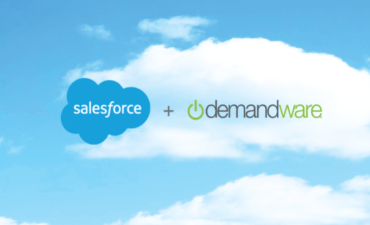
Salesforce Demandware, now known as Salesforce Commerce Cloud, is a cloud-based e-commerce platform designed to help businesses, especially those following the B2C marketing model, create a unified shopping experience.
It offers a centralized platform to manage large customer bases with ease, providing tools to personalize online stores (or storefronts) and deliver a seamless experience across multiple platforms. Whether it’s building a website, listing products, managing sales, or tracking progress, Demandware, as part of Salesforce Commerce Cloud, supports every step of the process.
This platform equips businesses with the necessary resources and processing power to create robust e-commerce sites, with AI-driven personalization and scalability, making it suitable for businesses of all sizes. Integration with Salesforce CRM, Marketing Cloud, and Service Cloud further enhances the ability to deliver a personalized and connected customer experience.
Salesforce Commerce Cloud evolved from Salesforce’s acquisition of Demandware in 2016, a leader in B2C e-commerce. This led to the launch of Salesforce B2C Commerce. In 2018, Salesforce also acquired CloudCraze, expanding its offerings to B2B commerce, now known as Salesforce B2B Commerce. With support for B2C, B2B, and D2C, Commerce Cloud offers e-commerce solutions for all types of businesses, integrating seamlessly with Salesforce products and third-party apps to deliver unified, connected customer experiences and drive loyalty.


Salesforce Commerce Cloud offers three core capabilities to help businesses implement their e-commerce strategies:
These features help businesses design, manage, and optimize their online sales strategies while ensuring a personalized and efficient customer experience.
Salesforce Cloud provides a dedicated environment for creating and launching B2C e-commerce websites, referred to as a “realm.” A realm contains all the necessary tools and instances for website development and deployment. Typically, a realm includes six instances: three Sandboxes and three main functional instances:
Merchants are responsible for tasks like merchandising, site configuration, and customization, while instance administrators oversee password management, user permissions, and starting instances. Our team of experts will guide you through the process of building your customized B2C e-commerce website according to your requirements.


Salesforce Demandware, now known as Salesforce Commerce Cloud, is a cloud-based e-commerce platform designed to help businesses, especially those following the B2C marketing model, create a unified shopping experience.
It offers a centralized platform to manage large customer bases with ease, providing tools to personalize online stores (or storefronts) and deliver a seamless experience across multiple platforms. Whether it’s building a website, listing products, managing sales, or tracking progress, Demandware, as part of Salesforce Commerce Cloud, supports every step of the process.
This platform equips businesses with the necessary resources and processing power to create robust e-commerce sites, with AI-driven personalization and scalability, making it suitable for businesses of all sizes. Integration with Salesforce CRM, Marketing Cloud, and Service Cloud further enhances the ability to deliver a personalized and connected customer experience.

Salesforce Commerce Cloud evolved from Salesforce’s acquisition of Demandware in 2016, a leader in B2C e-commerce. This led to the launch of Salesforce B2C Commerce. In 2018, Salesforce also acquired CloudCraze, expanding its offerings to B2B commerce, now known as Salesforce B2B Commerce. With support for B2C, B2B, and D2C, Commerce Cloud offers e-commerce solutions for all types of businesses, integrating seamlessly with Salesforce products and third-party apps to deliver unified, connected customer experiences and drive loyalty.

Salesforce Commerce Cloud offers three core capabilities to help businesses implement their e-commerce strategies:
These features help businesses design, manage, and optimize their online sales strategies while ensuring a personalized and efficient customer experience.

Salesforce Cloud provides a dedicated environment for creating and launching B2C e-commerce websites, referred to as a “realm.” A realm contains all the necessary tools and instances for website development and deployment. Typically, a realm includes six instances: three Sandboxes and three main functional instances:
Merchants are responsible for tasks like merchandising, site configuration, and customization, while instance administrators oversee password management, user permissions, and starting instances. Our team of experts will guide you through the process of building your customized B2C e-commerce website according to your requirements.
Copyright © 2025 Briskminds | All Rights Reserved